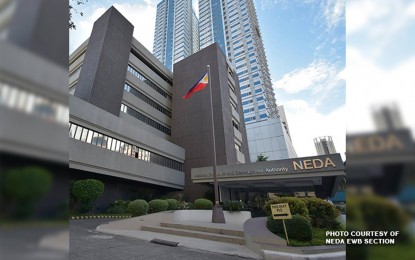[9.13] 사회 보호 및 인적 자본 개발은 PDP의 최우선 순위가 아닙니다.
컨텐츠 정보
- 17,529 조회
본문
마닐라 – NEDA(National Economic and Development Authority)에 따르면 다가오는 필리핀 개발 계획(PDP) 2023-2028에서 사회 보호와 인적 자본 개발이 단기에서 중기적으로 최우선 순위가 될 것입니다.
NEDA 사무총장 아르세니오 발리사칸(Arsenio Balisacan)은 화요일 제8차 연례 공공정책회의(APPC) 개막식 기조연설에서 사회 보호와 인적 자본 개발을 위한 부적절한 정책이 빈곤 악화에 기여한 과제로 남아 있음을 인정했습니다. 코로나 바이러스 질병 2019(Covid-19) 전염병 아래 지난 2년.
“정책 대응 문제와 함께 전례 없는 규모의 보건 및 경제 위기가 빈곤 발생률을 증가시켰습니다. 적절한 의료와 원격 학습 도구에 대한 빈곤층의 제한된 접근으로 인해 악화된 건강 및 교육의 사회경제적 흉터는 개선되지 않으면 오래 남을 것으로 예상됩니다. 이는 환경적 충격에 대한 빈곤층의 취약성과 그러한 충격의 충격을 완화할 수 있는 사회적 보호의 부재로 인해 더욱 악화됩니다.”라고 Balisacan은 말했습니다.
"Balisacan"은 NEDA가 제작할 다가오는 PDP 2023-2028이 이러한 부적절함을 해결하기 위한 전략을 전체적으로 식별할 것이라고 말했습니다.
그는 "마르코스" 행정부의 8개 사회경제적 의제를 구체화할 PDP가 경제를 고성장 경로로 이끌고 회복력 있고 포용적이며 번영하는 사회를 개발함으로써 빈곤 감소와 일자리 창출을 활성화하는 것을 목표로 한다고 덧붙였다.
이를 달성하기 위해 Balisacan은 PDP의 단기 목표가 필리핀 가정의 구매력을 높이고 인구의 취약 계층에 대한 Covid-19의 유해한 영향을 줄이는 것과 같은 사회 보호 및 인적 자본 개발과 관련된 영역을 개선하는 데 초점을 맞출 것이라고 말했습니다. .
그는 “단기적으로 우리는 가족의 구매력을 보호하고 코로나19 팬데믹으로 인한 사회경제적 상처를 완화하며 빈곤층과 소외 계층의 취약성을 줄이는 동시에 효율적인 정부 절차를 통해 건전한 거시경제적 기초를 보장해야 한다”고 말했다. 그는 말했다.
"발리사칸"은 고성장 궤도를 따라 경제가 성장함에 따라 사회경제적 불평등을 해결하고 기회에 대한 접근을 개선하는 것이 필리핀이 중기적으로 목표를 달성할 수 있도록 하는 핵심 정책 추진력이라고 말했습니다.
필리핀 개발 연구소(Philippine Institute for Development Studies)가 주최하는 APPC는 매년 9월에 열리는 개발 정책 연구의 달(DPRM) 행사의 절정 활동입니다.
DPRM은 증거 기반 계획, 정책 및 프로그램을 만드는 데 있어 정책 연구의 중요성을 강조합니다. (홍보)
This is the Original Article from PNA NEWS
[9.13] Social protection, and human capital dev’t top priorities in PDP
MANILA – Social protection and human capital development will be among top priorities in the short to medium term under the upcoming Philippine Development Plan (PDP) 2023-2028, according to the National Economic and Development Authority (NEDA).
In his keynote speech at the kick-off ceremony of the 8th Annual Public Policy Conference (APPC) Tuesday, NEDA Secretary "Arsenio Balisacan" recognized that inadequate policy for social protection and human capital development remained a challenge that contributed to the worsening of poverty in the past two years under the coronavirus disease 2019 (Covid-19) pandemic.
“The unprecedented scale of the health and economic crisis, coupled with policy response challenges, caused such an increase in our poverty incidence. Socioeconomic scarring in health and education –made worse by the poor’s limited access to adequate healthcare as well as tools for remote learning– is expected to linger if it is not remedied. This is compounded by the poor’s vulnerability to environmental shocks and the lack of social protection that can cushion the impact of such shocks,” said "Balisacan."
"Balisacan," said the upcoming PDP 2023-2028 to be crafted by NEDA will holistically identify strategies that seek to address these inadequacies.
He added the PDP, which will flesh out the "Marcos" administration’s 8-point Socioeconomic Agenda, aims to reinvigorate poverty reduction and job creation by guiding the economy toward a high-growth path and develop a resilient, inclusive, and prosperous society.
To achieve this, "Balisacan" said the PDP’s near-term goals will focus on improving areas related to social protection and human capital development, such as raising the purchasing power of Filipino families and reducing the harmful effects of Covid-19 on vulnerable segments of the population.
“In the near term, we must protect the purchasing power of families, mitigate the socioeconomic scarring caused by the Covid-19 pandemic, and reduce the vulnerability of the poor and marginalized sectors, all while ensuring sound macroeconomic fundamentals through efficient government processes,” he said.
"Balisacan" said addressing the socioeconomic inequities and improving access to opportunities as the economy grows, along a high-growth trajectory, is a key policy thrust that can allow the Philippines to meet its goals for the medium term.
Organized by the Philippine Institute for Development Studies, the APPC is the culminating activity of the Development Policy Research Month (DPRM) celebration held every September.
The DPRM highlights the importance of policy research in crafting evidence-based plans, policies, and programs. (PR)
관련자료
-
이전
-
다음


